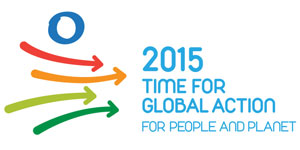 Ban welcomes UN Assembly’s endorsement of action plan on post-2015 development financing
Ban welcomes UN Assembly’s endorsement of action plan on post-2015 development financing
The United Nations General Assembly today endorsed the new global action agenda for financing sustainable development adopted two weeks ago by a major UN conference, and Secretary-General Ban Ki-moon welcomed the move as a major step that firmly puts the world “on the path to a more prosperous, just and sustainable world for this and future generations.”
| Concerned URL | http://www.un.org/apps/news/story.asp?NewsID=51506#.Vb8TJfkYqap |
|---|---|
| Source | UN News center |
| Release date | 31/07/2015 |
| Contributor | mlsusini |
| Geographical coverage | Global, |
| Keywords | sustainable development, United Nations, |
General Assembly President Sam Kutesa said today’s action “will further demonstrate our collective commitment towards eradicating poverty, achieving sustainable development and building a better future for all,” and urged UN Member States to “do whatever it will take to ensure that the Addis Ababa Action Agenda is fully implemented.”
The outcome document adopted at the Third International Conference on Financing for Development, which took place in Addis Ababa, Ethiopia earlier this month, the Action Agenda contains a series of bold measures to overhaul global finance practices and generate investments for tackling a range of economic, social and environmental challenges.
Building on the outcomes of previous development financing conferences held in Monterrey, Mexico, and in Doha, Qatar, the Action Agenda also addresses all sources of finance, and covers cooperation on a range of issues including technology, science, innovation, trade and capacity building.
In his statement to the Assembly, Mr. Ban said by endorsing the Addis Ababa Action Agenda, “we launch a new era of cooperation and global partnership.”
 He hailed the development as the foundation for success at the UN summit to adopt the UN post-2015 development agenda, in New York this September, and at the Conference of Parties of the UN Framework Convention on Climate Change (UNFCCC), known informally as COP 21, in Paris in December.
He hailed the development as the foundation for success at the UN summit to adopt the UN post-2015 development agenda, in New York this September, and at the Conference of Parties of the UN Framework Convention on Climate Change (UNFCCC), known informally as COP 21, in Paris in December.
“Only by staying engaged will we ensure that the commitments we endorse today will lead to tangible progress on the ground, in all countries and for all people,” the UN chief said.
Commending UN Members States for taking this critical step forward, he declared: “We are now firmly on the path to a more prosperous, just and sustainable world for this and future generations.”
Earlier this morning, Mr. Ban and Member State representatives paid tribute in a General Assembly session to the late Permanent Representative of Djibouti, Ambassador Roble Olhaye, the longest serving top diplomat at the UN, calling him a passionate champion of Africa and a great believer in the value of the continent’s partnership with the United Nations.
Link to the Outcome document of the Third International Conference on Financing for Development: Addis Ababa Action Agenda.
Paragraph 17 of the Addis Ababa Action Agenda addresses Biodiversity: Protecting our ecosystems for all.
All of our actions need to be underpinned by our strong commitment to protect and preserve our planet and natural resources, our biodiversity and our climate. We commit to coherent policy, financing, trade and technology frameworks to protect, manage and restore our ecosystems, including marine and terrestrial ecosystems, and to promote their sustainable use, build resilience, reduce pollution and combat climate change, desertification and land degradation. We recognize the importance of avoiding harmful activities.
Governments, businesses and households will all need to change behaviours, with a view to ensuring sustainable consumption and production patterns. We will promote corporate sustainability, including reporting on environmental, social and
governance impacts, to help to ensure transparency and accountability. Public and private investments in innovations and clean technologies will be needed, while keeping in mind that new technologies will not substitute for efforts to reduce waste or efficiently use natural resources.
Please note that this information has expired.
 This site uses cookies in order to function as expected. By continuing, you are agreeing to our
This site uses cookies in order to function as expected. By continuing, you are agreeing to our 




